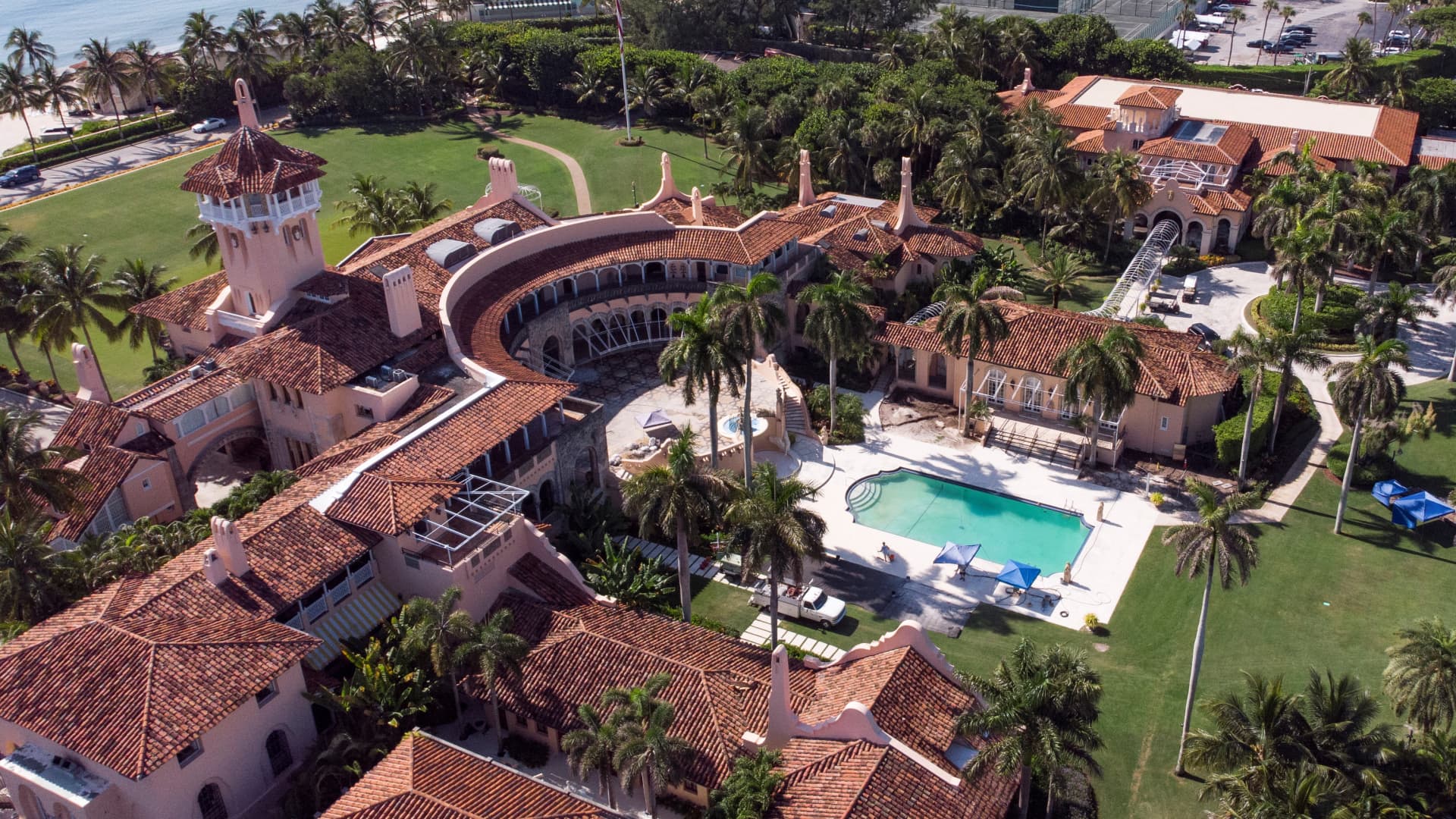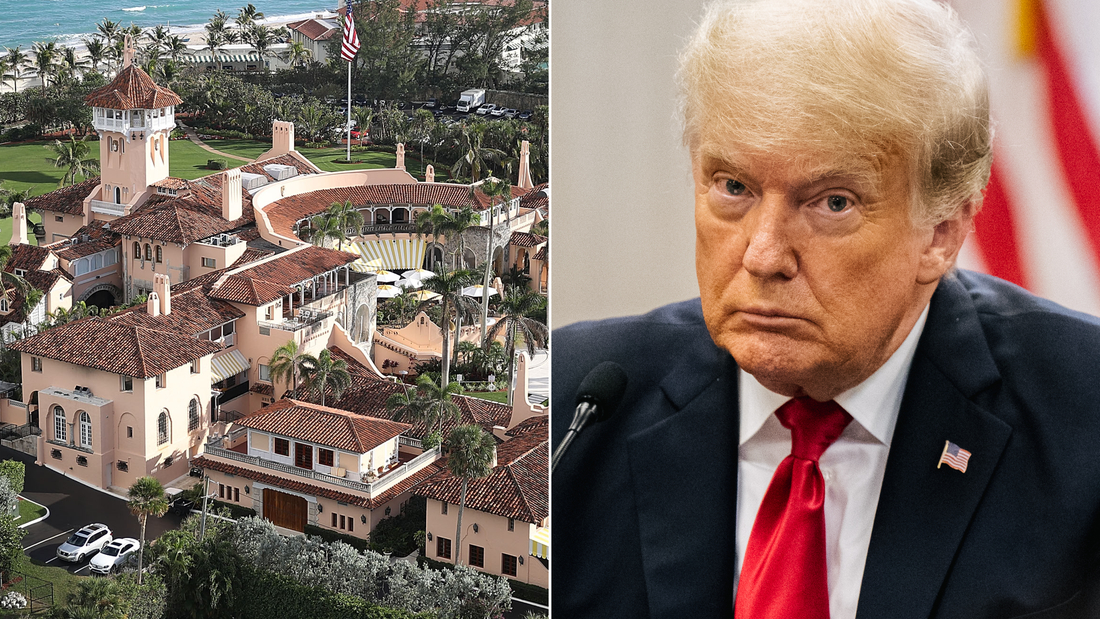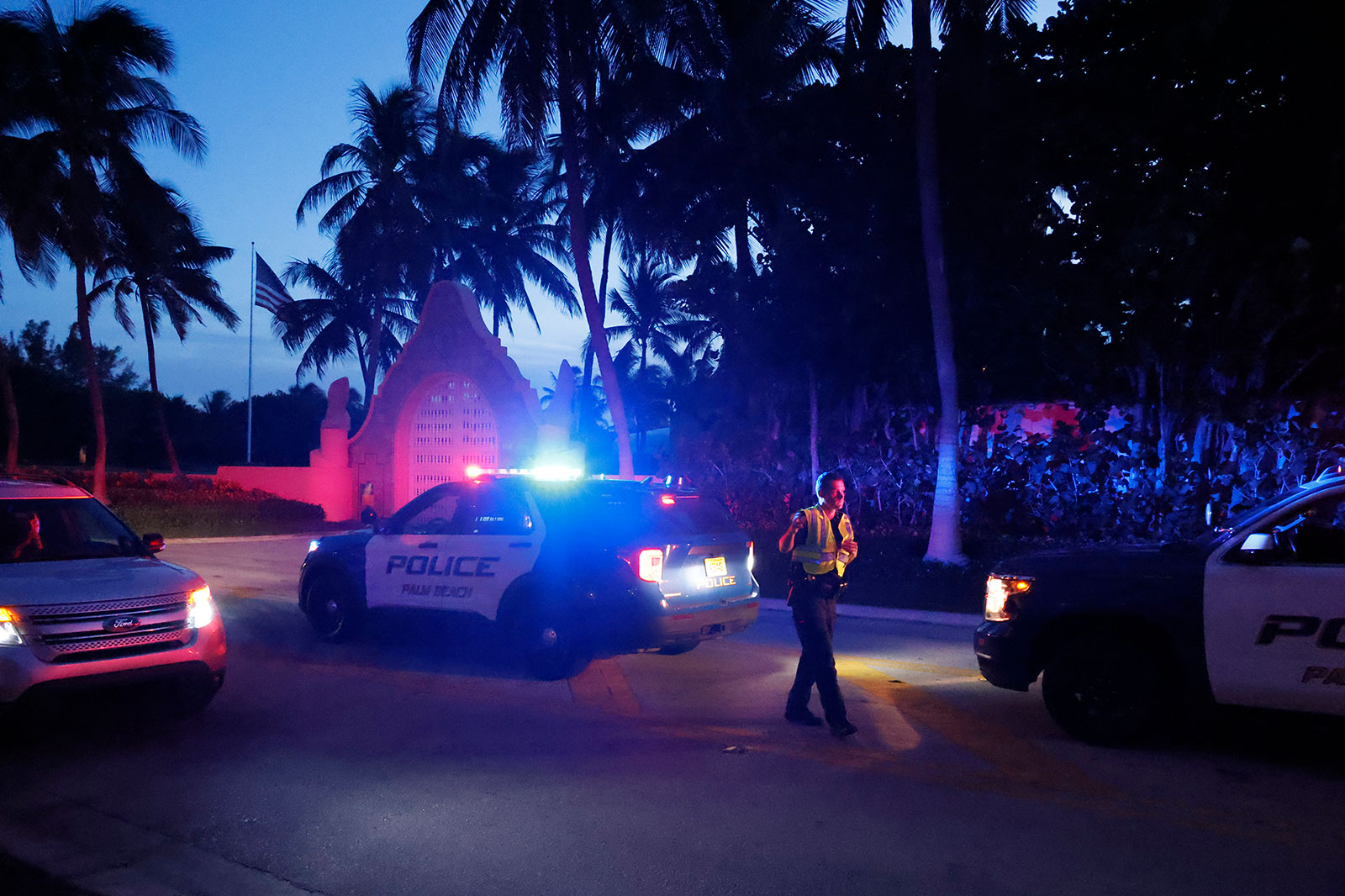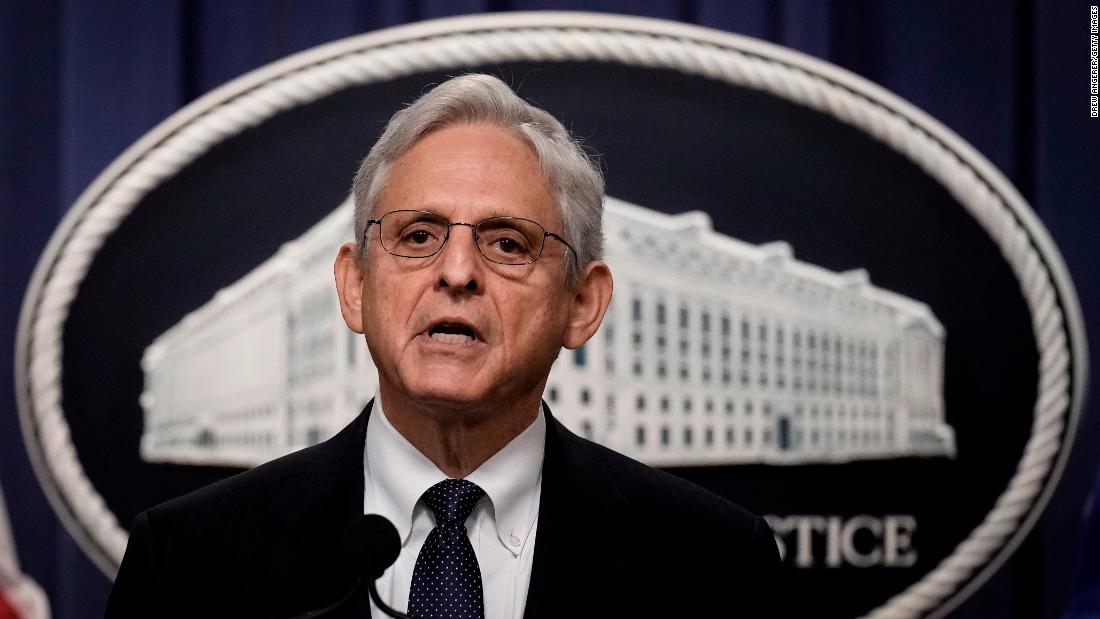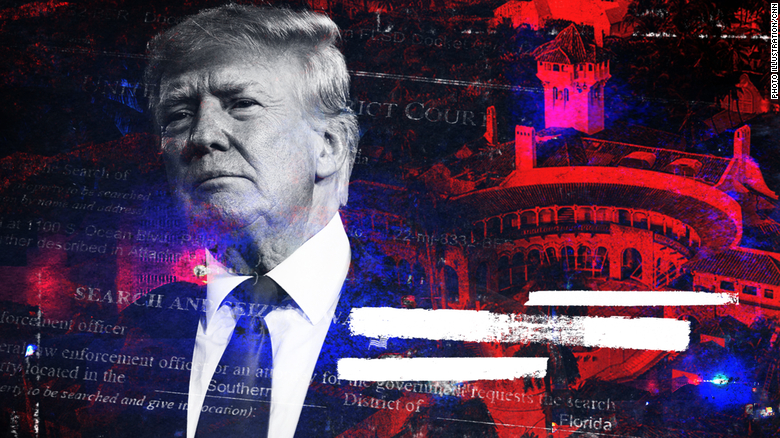
The Department of Justice released a version of the document it used to convince a judge to issue a warrant to seize documents from former President Donald Trump's Mar-a-Lago residence. The affidavit, which a judge ordered the Justice Department to release, lays out why the FBI felt there was probable cause that crimes had been committed.
Despite redactions, the affidavit includes many new details and clues about why the FBI and the National Archives worried about "a lot of classified records" mixed in with other things at Trump's house, which is also a private club and resort.

The first redaction in the document, on the first page, is the name of the FBI agent who wrote and signed this 32-page affidavit.
We also definitively see the FBI is conducting a criminal investigation, although it does not specifically name former President Donald Trump as the target, and that the National Archives referred the potentially illegal activity after retrieving 15 boxes of documents, which intermingled classified documents with other things from Trump in January.
The affidavit is redacted to shield the identities of witnesses, details about a federal grand jury, and to hide specifics about the ongoing investigation. Magistrate Judge Bruce Reinhart ruled the redactions were "narrowly tailored to serve the Government’s legitimate interest in the integrity of the ongoing investigation."

The FBI was initially investigating the 15 boxes already turned over by Trump. They wanted to know how those boxes got to Mar-a-Lago, whether classified documents were stored improperly and whether people who should not have seen classified information saw these documents.
The FBI agent who signed the affidavit ****cites experience and training with counterintelligence and espionage investigations and the use and storage of sensitive information.
What’s not clear is what led the FBI to believe there were additional documents at Mar-a-Lago. CNN has reported that at some point the DOJ began to suspect the Trump team was not being truthful and a witness came forward.

The agent says this affidavit is not exhaustive of the facts known by the FBI. It simply establishes probable cause for the search. It also, conversely, does not allege a crime against Trump or anyone else. This is common boilerplate language often found in FBI affidavits.
Read 18 U.S. Code § 793 here. It concerns “gathering, transmitting or losing defense information.”

The system of classifying information as sensitive or classified is not set out in law. Rather, the rules are spelled out in a presidential executive order. The most recent update came during the Obama administration, with Executive Order 13526. Read it.
This page outlines some of the different classifications of information. Even though we get very little information about the specific nature of classified documents Trump had, we can infer from the inclusion of these definitions that the documents at Mar-a-Lago ranged from Top Secret -- requiring special storage -- to even more restrictive sub-classifications that required special access.
CNN’s Katie Bo Lillis laid out the various classifications here.

HUMINT involves human intelligence, and disclosing identities could put sources who provide information to the US at risk in foreign countries.
NOFORN is an important designation because it signifies information that is not supposed to be given to foreign governments or individuals without an OK from the agency that developed or obtained the intelligence.

Here we learn the sections of federal law and regulations that may have been violated.
The Code of Federal Regulations — or CFR — is published annually by federal agencies. 32 C.F.R Parts 2001 and 2003 are federal regulations from the National Archives related to the handling of classified national security information.
But the affidavit also cites Title 18 of the US Code — that’s federal law. 18 US § 1519 has to do with the “destruction, alteration, or falsification of records in Federal investigations and bankruptcy.” Read it.
18 US Code § 2071 has to do with the “concealment, removal, or mutilation generally” of federal documents or property. Read it.

The PRA is the Presidential Records Act, passed by Congress in the aftermath of Richard Nixon’s failed attempt to take presidential documents with him out of the White House after Watergate. For an explanation of why the American public, and not the former president, own Trump’s presidential documents, click here.


A good portion of what we have learned about this case, including the first news of the search itself, has come either from Trump’s own statements or disclosures by his allies.

We’re getting heavily into redactions here.

Here’s that CBS affiliate report. Remember, this is two days before President Joe Biden took office. The images of moving trucks at Mar-a-Lago were captured by news helicopters keeping watch on Trump’s soon-to-be permanent address.


Points 24-37 in the affidavit establish probable cause. Starting on this page we shift to “Provision of the Fifteen Boxes to NARA.”

An important date here. By early May 2021, a few months after Trump left office, the Archives had already established that it was missing documents covered under the Presidential Records Act and was told 12 boxes had been “found” and were ready for pick up at Mar-a-Lago. See a full timeline of what we know.

After the affidavit was released, Trump responded on Truth Social, calling it "a total public relations subterfuge by the FBI & DOJ.”


This is important. The FBI identified 184 classified documents in the 15 boxes given by Trump to the Archives. These included 92 documents classified SECRET and 25 documents classified TOP SECRET.
The documents have additional markings, such as NOFORN, and also handwritten notes by Trump.
“Based on my training and experience, I know that documents classified at these levels typically contain” national defense information, the affidavit says.
We have entered a new portion of the affidavit, which outlines that there was classified information in the 15 boxes of presidential records Trump turned over to the Archives in January 2022.


The Justice Department left unredacted Trump’s claim, through his lawyers, that he could issue some sort of blanket declassification order. It also describes a claim from Kash Patel, a former Trump national security aide who was named as one of Trump’s designees to the National Archives in June.
CNN’s Jeremy Herb noted: The investigator who wrote the affidavit cited a May article from right-wing website Breitbart, in which Patel claimed reports that the National Archives found classified material at Mar-a-Lago were “misleading” because Trump had declassified the materials.
The rest of the section in the affidavit, however, is classified, so it’s not clear why federal investigators cited Patel’s comments.
Since the FBI’s search, Trump has pointed to a January 19, 2021, memo in which he declassified documents related to the FBI’s Russia investigation. There’s no evidence, however, that those materials were what the FBI was looking for when it searched Mar-a-Lago earlier this month.



More important clues.
A DOJ lawyer says the documents in the 15 boxes were removed from a secure facility at the White House on January 20, 2021, the day Trump left office.
The lawyer specifically told Trump’s lawyers the documents were not handled appropriately and asks Trump’s attorney to secure and preserve the room at Mar-a-Lago where the 15 boxes had been stored.

If nothing else, we know Trump’s lawyers saw DOJ’s request.



The DOJ has redacted its arguments laying out probable cause for the August search at Mar-a-Lago. CNN’s Marshall Cohen, Tierney Sneed and Jeremy Herb reported that in a legal brief also made public Friday, prosecutors wrote that these details had to be redacted because they would provide a "road map" to the investigation and that revealing "this information could thus adversely impact the government's pursuit of relevant evidence." Read more here.



Here are some new details. The FBI was looking at more than a storage room and Trump’s “45 Office.” They also focused on his “residential suite” and a room identified as Pine Hall. Here’s a picture of Pine Hall from the Library of Congress. It’s described as “antechamber to the owner’s suite.”

The FBI took pains to make clear that Mar-a-Lago club members would not be disturbed by the search.
The conclusion asks for a search warrant, which was granted and then kept under seal. Read key lines from that document here.

Two teams of agents were sent to Mar-a-Lago. The Case Team was the main group of agents on the case and they were planning to search the storage room. A second team, the Privilege Review Team, searched Trump’s office and sought to separate any documents with information that could be considered “attorney-client privileged” and keep those away from the Case Team.
Earlier this week, Trump’s legal team asked for a “special master” to review the materials that were retrieved under the search warrant. Their request is still pending.

The affidavit was submitted on August 5, a Friday. The search was conducted the next Monday, August 8.


This May letter from Trump’s attorney complained there had been public reporting about the DOJ investigation into Trump’s handling of classified documents. It argued that he voluntarily handed over documents, which may be an oversimplification.

Trump’s lawyer argued the president has sweeping “unfettered” authority to declassify documents — and that neither presidents nor former presidents can be prosecuted with regard to classified documents. That’s the heart of Trump’s defense so far.

Trump’s lawyer demanded that his letter arguing Trump had “unfettered” ability to de-classify documents be presented to any judge considering the matter. On that request, the FBI complied.

Here’s a description of Mar-a-Lago, Trump’s sprawling 58-bedroom Florida estate. The FBI promised that the search, according to the affidavit, would not extend beyond areas used by Trump.

The first thing the FBI wanted to do was seize any classified documents and the boxes or containers that held them. The last was any evidence of “knowing alteration, destruction, or concealment” of records.
#Read #redacted #document #federal #government #convince #judge #issue #warrant #seize #documents #MaraLago #lays #government #felt #probable #crimes #committed https://www.globalcourant.com/read-the-redacted-document-the-federal-government-used-to-convince-a-judge-to-issue-a-warrant-to-seize-documents-from-mar-a-lago-it-lays-out-why-the-government-felt-there-was-probable-cause-that-crim/?feed_id=16392&_unique_id=6309a0ac8b128

